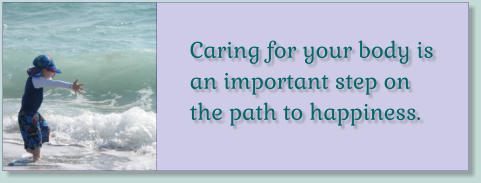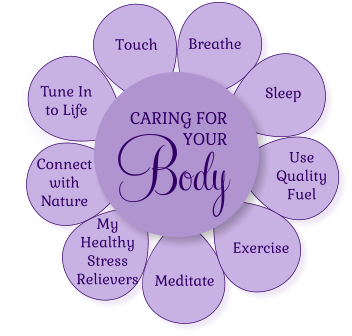

CARING FOR YOUR BODY
Our body is the vehicle in which we drive through this life. Its functioning affects our experience of life, because we rely on our senses to perceive the world around us, and because it provides the soil for the other aspects of us to exist. You may have noticed that your mood is impacted when you are hungry, dehydrated or tired. Many people get crabby; their thinking is less clear, and they are less pleasant to be around. When you are in physical pain, you are more likely to be depressed (and vice versa). Physical relaxation techniques, such as progressive relaxation which involve tightening and then relaxing the different muscle groups of the body, are important skills to cultivate. Caring for your body is an important step on the path to happiness.Breathe
Deep, slow breathing tells your body that it is safe. Taking deep breaths, filling your lungs and feeling your belly rise, has been shown to reduce the body’s reaction to stress and improves the functioning of your immune system. Whenever you feel anxiety, fear, worry or pain, take some slow, deep breaths into your belly, and breathe out fully. This tells your body to relax. One technique is to count – try breathing in for four counts, holding the breath for eight counts, breathing out (all the way out) for eight counts, and then waiting another four counts to breath in. Dr. Jim Nicolai of Miraval teaches breath walking, which is a four-count in-breath followed by a four- count out-breath. Some practices have you breathe through your nose both in and out. Others tend to breathe in through the nose and out through a slightly open, but relaxed mouth. Experiment to discover what works best for you.Sleep
Getting enough sleep has a profound impact on your health, your mood and how you feel. It affects your mental acuity, your responsiveness to your environment, your immune system and even your metabolism. The invention of the electric light, to say nothing of all of today’s electronic gadgets, contributes to most of us being sleep deprived. Research indicates eight hours of sleep per 24 hours period is a really good idea for most people. Making your room quiet and dark is important to the quality of sleep. Naps are beneficial, if you can train yourself to nap well. Many successful business people incorporate naps into their schedules. To learn more, see How to Nap.Use Quality Fuel (Food, Etc.)
What you put into your mouth influences both your body and your mood. When you are dehydrated, your physical and mental functioning is reduced. Make an effort to be mindful of how your body reacts to the various things you eat and drink – sugar, artificial sweeteners, alcohol, processed foods, fresh foods, caffeine, etc. To keep your body running well, improve your mood and to build your resilience in the face of stress, try to use high-grade fuel (including proteins, fresh vegetables and fruits). Don’t let yourself get to ‘empty.’ Your body and your emotions will thank you for it!Exercise
Physical exercise has a profound impact on mood, as well as on the functioning of our immune system. Exercise is one of the most helpful treatments to reduce or eliminate depression. It also reduces agitation and can improve your sleep. Of course we know exercise has a powerful impact on physical health. Regular exercise (3-5 hours of walking per week is a standard in much of the research) has been found to significantly reduce both the occurrence of breast cancer and its recurrence after surgical therapy. Many people get blocked by coming up with a grand exercise plan and when they fall short of their goals, they give up entirely. Take baby steps. Park further from the store, take the stairs rather than an elevator, start with 5 minutes of exercise, or dance while you watch TV. Engage in the forms of exercise that are most enjoyable to you. Remind yourself that moving your body will improve your life in multiple dimensions.Meditate
Brain imaging research shows that when practiced meditators meditate, there is increased activity in the parts of the brain activated when one experiences pleasure and serenity. Studies of Buddhist monks who have deep meditation practices have shown significant long-term changes to their brains, not just when they meditate. They also test as being happy with their lives. Studies that teach people to meditate for 20 minutes a day for four days show reductions in anxiety, and improvements to the immune system (tested by antibodies to the flu virus). Finding ways to focus inward – whether on your breath, a mantra, or just observing what you are sensing without attachment – and bringing your mind back when it wanders – is a powerful practice. For an introduction to meditating, check out Martin Boroson’s video “How to Meditate in a Moment.” Many yoga traditions incorporate meditation. Progressive relaxation can be another form of meditation. Try various techniques to see what works best for you.My Healthy Stress Relievers (Music, Reading, Hobbies. Etc.)
Identify the things you enjoy that reduce your stress levels and make a point of doing them on a regular basis (every day would be good!). Music is a powerful way to shift your mood. Find the songs that make you happy and listen to them regularly. What you read will impact your mood – do you like biographies, or happy endings? Do you like learning or being entertained? Try those hobby activities that have always interested you. Learn to paint, or do woodworking, knit, or go bird- watching. Try a warm bath, with candlelight and some favorite music. Maybe talking with a friend, or playing with a pet, a walk in the woods or some other form of exercise works best for you. Sometimes a silly television show, or a break reading a Calvin and Hobbes cartoon book is what you need. Make a list of the things that work for you. Create a list of strategies to use in stressful situations, as well as practices to engage in on a regular basis to reduce your overall stress level.Connect with Nature
Being in and focusing on the beauty and wonder of nature helps us gain perspective on our lives. It can also help us feel a part of something larger than ourselves. Bring your curiosity – pretend to be a child or an explorer discovering your environment for the first time in order to get the full benefit. Inspect the bugs you come across, lie down in the grass or hug a tree. Take a walk in the rain or in a snowstorm, feel the ground beneath your feet. Focus on the miracles that surround us and let yourself be awed. If you can’t get outside, look at some great nature videos on YouTube or on-line slideshows or a book.Tune In to Life
This form of meditation involves narrowing your focus to pay attention to the messages that come through your body and mind. It entails tuning in to what draws your attention in the moment. It usually starts with noticing a physical sensation and holding your attention on it until it shifts or something else in the moment takes its place. You can learn to tune in to the flow of energy in different parts of your body. This practice can be experienced in a group. In that case, each person shares what they are experiencing as they feel drawn to speak. Sometimes interesting visual images emerge and are woven together. Learn more from Tesa Silvestre, who studies and teaches body and energy literacy, the internal requirements that support making a difference in the outside world.Touch (Hugs, Massage, Pets, Etc.)
Good touch stimulates the release of oxytocin – the hormone and neuropeptide that relaxes the body (reducing blood pressure and other physiological symptoms of stress). Some refer to oxytocin as the love hormone because sex, giving birth and nursing all trigger its release, as do other forms of touching. Touch creates a willingness to be open that encourages us to connect with others, and connection correlates strongly with happiness. With frequent enough positive touch, the oxytocin levels stay somewhat elevated, increasing the sensation of pleasure and leading to more openness, thereby increasing our levels of connection. Apparently, face-to-face hugs are one of the best touch triggers – hence the advice to get/give five to seven hugs a day! Have you ever watched the Free Hugs video on YouTube? Did you notice the smiles on the faces of people who just had the courage to hug a stranger? There has been some research indicating that a longer hug (20 – 30 seconds) has particularly beneficial effects. Massage relaxes muscle tensions and provides a neutral form of touch. Of course, loving touch is the most blissful, but find ways to add enjoyable touch (respecting other people’s preferences about being touched) to your life. While human touch seems to have the most powerful impact, petting an animal friend also has a powerful positive impact on well-being.
Choose to be happier!
You have found the place
to learn what YOU can do
to have a happier,
more fulfilling life!
© Molly L. Stranahan, Psy.D. 2022

Identifying My
Stress Relievers
(PDF) will help you
create a list of what
helps reduce your
stress level.












Subscribe to our Newsletter

























